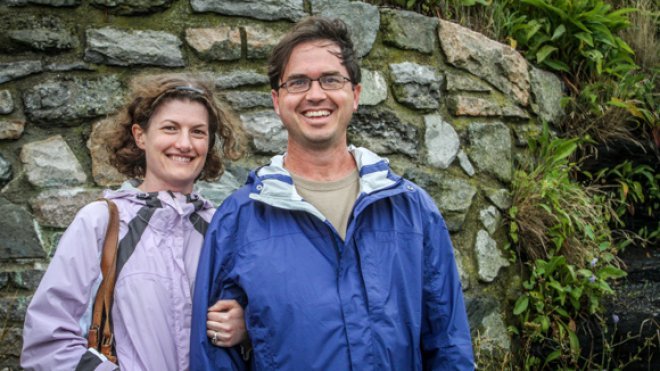RWU Professor Earns Lifetime Achievement Award for Work in Marine Aquarium Industry
Associate Professor of Marine Biology Andrew Rhyne has earned the Marine Aquarium Societies of North America Award for helping to shape the aquarium hobbyist trade

BRISTOL, R.I. – A pioneer of many ventures within the marine aquarium trade, Roger Williams University's Andrew Rhyne received the Marine Aquarium Societies of North America (MASNA) Award for contributing a lifetime of achievement through his influential work.
At RWU, Rhyne, an associate professor of marine biology, has developed aquaculture programs marine ornamental fish aquaculture programs that supply vibrant, eye-catching species like Queen Triggerfish and Clownfish for the aquarium hobbyist trade and institutions like New England Aquarium and Mystic Aquarium; by breeding and raising tropical fish in aquaculture programs, it reduces the impact of wild species collected from reef habitats.
Rhyne also leads efforts to develop technological solutions for tracking the aquarium hobbyist trade – not much is known about how many and what types of species are actually being removed from the wild and sold into the hobbyist market – as well as to help detect illicit wildlife trade as they enter United States ports. For the latter endeavor, Rhyne and his co-collaborator from New England Aquarium invented "smart invoice" technology that conducts a real-time forensics analysis on imported wildlife shipments to ferret out suspicious trade activities before the package leaves the port. Their invention won the U.S. Agency for International Development's international Wildlife Crime Tech Challenge award.
Since 1995, the MASNA Award has recognized leading scientists who are positively shaping and influencing the marine aquarium trade. MASNA named Professor Rhyne as the recipient of the 2017 MASNA Award this week, stating:
Andrew L. Rhyne has invested his career in understanding marine ornamental aquaria: the biology of aquarium fishes and invertebrates, as well as the industry driven by human fascination for these creatures. The trade in aquarium species can be considered a data-limited industry and the lack of available trade data hinders sustainability movements within the trade. Rhyne has worked to develop solutions to these data gaps. He has worked to advance the field of marine ornamental aquaculture, developing methods for breeding and rearing popular species in aquaria. Rhyne’s body of work illuminates life histories, husbandry and larval rearing requirements of aquarium fish and invertebrates. He has pioneered methods for culturing calanoid copepods and this has greatly increased the success of hobbyists and researchers with small tropical marine fish larvae.
Rhyne has reared dozens of marine fish and invertebrates, many of them bred for the first time in captivity. Notability his lab reared the first triggerfish (the Queen Triggerfish) in captivity as part of a joint program with the New England Aquarium, a program aimed at expanding the number of captive-bred species on display in public aquaria. Through this innovative program, Rhyne and colleagues developed a larval rearing system specifically designed public aquariums, supplying systems and training to over 20 institutions. These systems have produced thousands of fish for display, reared onsite at public aquariums. Rhyne proactively teaches others the skills that he has developed to support the development of marine ornamental aquaculture.
He is currently an Associate Professor of Marine Biology at Roger Williams University in Bristol, R.I., where he has helped to develop an undergraduate major/minor in aquaculture and aquarium science. At Roger Williams University, he manages an active undergraduate research laboratory focused on the aquarium trade and aquaculture, oversees the husbandry and life-support systems at the Environmental Education Center of the Audubon Society of Rhode Island, a small public aquarium, and also maintains a partnership with the New England Aquarium to develop rearing methods for aquarium species. Rhyne has published over 50 peer-reviewed articles and book chapters and is the recipient of numerous awards. Most recently he won a Grand Prize in the Wildlife Crime Technology Challenge.
Rhyne received his B.S. from the University of North Carolina Wilmington, and his M.S. and Ph.D. from the Florida Institute of Technology in Melbourne, Fla., working with his mentor the late Junda Lin. He and his wife Libby, along with their twins Darwin and Amelia, live in Rhode Island.